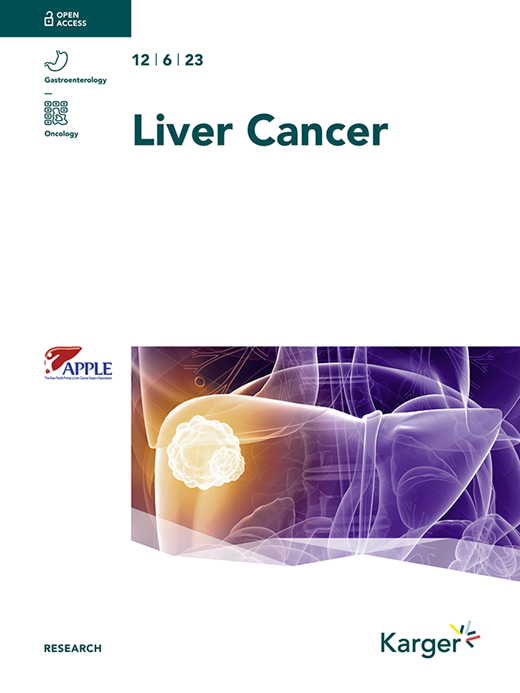肝内胆管癌的遗传/表观遗传改变与肿瘤免疫微环境:用分子靶向药物改变免疫微环境
IF 9.1
1区 医学
Q1 GASTROENTEROLOGY & HEPATOLOGY
引用次数: 0
摘要
背景肝内胆管癌(iCCA)通常在晚期诊断,导致治疗选择有限和预后不良。到目前为止,晚期iCCA的标准全身治疗是吉西他滨和顺铂的联合治疗。然而,最近对iCCA分子特征的理解取得了进展,为分子靶向治疗和免疫治疗开辟了新的可能性。据报道,9-36%的iCCA病例存在基于免疫基因表达特征的炎症性肿瘤免疫微环境(TME),其特征是存在参与抗肿瘤免疫反应的免疫细胞。大多数iCCA病例具有缺乏效应T细胞的非炎症性TME,使得免疫检查点抑制剂(ICIs)在这些病例中无效。有趣的是,在iCCA的非炎症TME中经常观察到成纤维细胞生长因子受体(FGFR2)基因和IDH1/2基因突变的改变。已经报道了驱动突变在iCCA独特的TME建立中的作用的几种机制。例如,引起DNA甲基化增加的IDH1/2突变与抗原加工和递呈机制的下调和高甲基化有关,这可能有助于建立非炎症性TME。因此,靶向IDH1/2的抑制剂可能会恢复参与抗原呈递的分子的DNA甲基化和表达状态,从而潜在地提高ICIs的疗效。FGFR抑制剂也可能通过抑制细胞因子信号1的抑制因子和激活干扰素-γ信号作为抑制FGFR信号的结果来调节免疫抑制性TME。从这个角度来看,了解iCCA的分子特征,包括TME和驱动突变,对于iCCA的有效应用和分子靶向治疗至关重要。针对肿瘤和免疫系统的联合治疗方法有望改善iCCA患者的预后。需要进一步的研究和临床试验来验证这些方法并优化iCCA的治疗策略。本文章由计算机程序翻译,如有差异,请以英文原文为准。
Genetic/epigenetic alteration and tumor immune microenvironment in intrahepatic cholangiocarcinoma: Transforming the immune microenvironment with molecular targeted agents
Background Intrahepatic cholangiocarcinoma (iCCA) is often diagnosed at an advanced stage, leading to limited treatment options and a poor prognosis. So far, standard systemic therapy for advanced iCCA has been a combination of gemcitabine and cisplatin. However, recent advancements in the understanding of the molecular characteristics of iCCA have opened new possibilities for molecular-targeted therapies and immunotherapy. Summary Reportedly, 9–36% of iCCA cases have an inflamed tumor immune microenvironment (TME) based on the immune gene expression signature, which is characterized by the presence of immune cells involved in anti-tumor immune responses. The majority of iCCA cases have a non-inflamed TME with a lack of effector T cells, rendering immune checkpoint inhibitors (ICIs) ineffective in these cases. Interestingly, alterations in the fibroblast growth factor receptor (FGFR2) gene and IDH1/2 gene mutations are often observed in the non-inflamed TME in iCCA. Several mechanisms have been reported for the role of driver mutations on the establishment of TME unique for iCCA. For example, IDH1/2 mutations, which cause an increase in DNA methylation, are associated with the downregulation and hypermethylation of antigen processing and presentation machineries, which may contribute to the establishment of a non-inflamed TME. Therefore, inhibitors targeting IDH1/2 may restore the DNA methylation and expression status of molecules involved in antigen presentation, potentially improving the efficacy of ICIs. FGFR inhibitors may also have the potential to modulate immunosuppressive TME by inhibiting suppressor of cytokine signaling 1 and activating the interferon-γ signaling as a consequence of inhibition of FGFR signal. From this perspective, understanding the molecular characteristics of iCCA, including the TME and driver mutations, is essential for effective application of ICIs and molecular-targeted therapies. Key Messages Combination approaches that target both the tumor and immune system hold promise for improving the outcomes of patients with iCCA. Further research and clinical trials are needed to validate these approaches and optimize the treatment strategies for iCCA.
求助全文
通过发布文献求助,成功后即可免费获取论文全文。
去求助
来源期刊

Liver Cancer
Medicine-Oncology
CiteScore
20.80
自引率
7.20%
发文量
53
审稿时长
16 weeks
期刊介绍:
Liver Cancer is a journal that serves the international community of researchers and clinicians by providing a platform for research results related to the causes, mechanisms, and therapy of liver cancer. It focuses on molecular carcinogenesis, prevention, surveillance, diagnosis, and treatment, including molecular targeted therapy. The journal publishes clinical and translational research in the field of liver cancer in both humans and experimental models. It publishes original and review articles and has an Impact Factor of 13.8. The journal is indexed and abstracted in various platforms including PubMed, PubMed Central, Web of Science, Science Citation Index, Science Citation Index Expanded, Google Scholar, DOAJ, Chemical Abstracts Service, Scopus, Embase, Pathway Studio, and WorldCat.
 求助内容:
求助内容: 应助结果提醒方式:
应助结果提醒方式:


